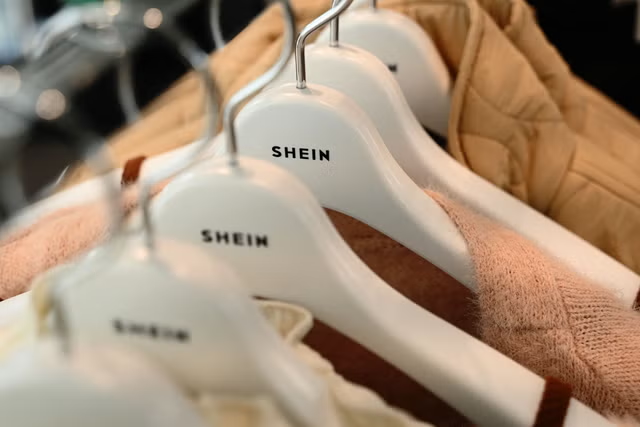Patrick Grant is talking numbers. “70 per cent of the world’s clothes are made from synthetics. A government report states that another 8 million jobs will be lost in the next decade as AI takes over warehouses and transportation… Textile production in Britain used to account for over 20 per cent of jobs here,” says Grant, speaking from his home in Lancashire on an issue that’s affecting the whole of the UK, and the world.
And horrifyingly, “eight billion tonnes of plastic has been created on our planet just since the 50s. That’s one tonne of plastic for every living human being.” Those are some sobering statistics, and Grant – who in recent years has become a household name thanks to his career pivot to television star via Great British Sewing Bee - has made it his mission to highlight them. That rallying cry – which began life in 2018 as a Ted Talk – has turned into his new book, Less, a manifesto on how we should consume now.

I’m used to seeing the dashing Grant, who at 52 is chiselled of jawline and has a sweep of moustache which makes him look like a debonair 1940s RAF pilot, in the rarefied environs of London fashion events or Savile Row, where he acted as custodian to historic tailor Norton & Son for many years. Today he’s up north, near to where the factory for his Community Clothing enterprise in Blackburn operates. As sunlight streams across the background of his living room – he’s in the midst of renovations – the conversation is rather sombre.
Less is a deep dive into our relationship with consumerism, the toxic effects of fast fashion and the demise of British industry across myriad sectors, from textiles to craft. It’s a call to action, with good reason; the effect of cheaply-made, synthetic clothes from etailers like Asos, Shein, Temu, Pretty Little Thing and Boohoo on both the environment and UK jobs and industry is seismic, with historic factories and British brands – many of whom trade on their British identity – choosing to manufacture in Asia for lower costs, collapsing entire communities in the process.

“When you pick up a packet of cigarettes you’re confronted by the fact of what they’ll do to you. If there was a picture of Rana Plaza on every item of synthetic clothing bought for £1 from China, you’d think differently,” says Grant, referring to the 2013 tragedy in which a factory in Bangladesh housing workers in squalid conditions collapsed, killing 1,134 people.
Grant has been committed to the importance of locally-made from the get go; buying ailing tailor Norton & Son in 2005 aged just 33, going on to support and foster British industry throughout his career via collaborations with John Lewis and historic house E Tautz, and his current enterprise, Community Clothing.

Chore jacket, £115, communityclothing.co.uk

Raincoat, £199, communityclothing.co.uk
“We used to have a great understanding in Britain of how and where things were made, from our clothes to our pots and pans. I’ve got a kettle that I’ve had for around 25 years. The UK was a rich mine of industry – steel in Sheffield, textiles in the Scottish borders – and things were built to last,” he says. It might seem counterintuitive for a designer – whose career is built on selling clothes – to be encouraging customers to buy less, although it was also the mantra of the late Vivienne Westwood, who famously said “buy less, choose well, make it last” in her mission statement to alleviate fashion’s devastating on the planet. “I still love fashion,” he confirms.
So what should the average man be doing to dress well in a way that doesn’t damage our green and pleasant land?
Learn about what you’re buying
“We can choose how we spend our money, whether that’s a mug or an item of clothing. And I prefer to know how it’s made and where it came from,” says Grant. “It gives so much more pleasure if you feel connected to that process, and you use it every day knowing that.” An anonymous package from China might arrive in record time, but there’s very little soul to that transaction, and deeply questionable practices in how it’s got to your front door.

Buy cheap, buy twice
Grant has a thing about pans. Staying in rental apartments while filming, he writes, he’s continually astonished by the lack of quality cookware, replaced instead with items which need to be replaced every couple of years. I had a similar epiphany with T-shirts. A Sunspel T-shirt, for example, might cost you a pricey £85 (although keep an eye out for the sale), but it’s handmade in Long Eaton by British craftspeople and made in a way that’s designed to last – I paid a visit years ago and watched the process. Far better than an £8 version from Zara that sags and comes apart after six months. “We’ve forgotten the false economy market, and we need to realise that you shouldn’t be replacing household items all that often,” says Grant.
Best of British
One of the most sobering parts of Grant’s manifesto is focused on the demise of our truly great British industries, and the communities fueled by them, from weavers in Hawick and the Hebrides to the Cottonopolis that was Manchester in the 1900s. That said, there’s a thriving Made in Britain movement as outlined by Grant.
You can opt to buy from his Community Clothing venture, or use the reference list of British manufacturers he includes in the book. “When I was born, there were still around one million people employed in the UK making clothes, and with just a little bit of thinking and research you can order from a great British maker rather than a few clicks on a fast fashion website.”

Lambswool sweater, £69.50, communityclothing.co.uk
Think about where your clothes go afterwards
Acrylics, polyester, nylon and materials that employ elastics are made from crude oil and fossil-fuel based resources; 342 million barrels of oil are used to make synthetic fabrics every year. If they are readily disposed of – as cheap, ultra fast fashion products often are – that sits in landfill; a mountain of discarded clothes in Chile is now visible from space.
Take care of things
“It’s something that was so ingrained in older generations, and we need to get back to looking after our clothes to extend their life. Buy good shoes, polish them and use shoe trees, brush your overcoat when you put it away, steam your clothes to kill bacteria, take pride in them,” says Grant. “When you have too much stuff, your wardrobe becomes packed to the gills and you don’t remove things and air them, so moths breed. Repair, re-use and respect how it was made.”
Less: Stop Buying So Much Rubbish: How Having Fewer, Better Things Can Make Us Happier (£22) was published by HarperCollins and is available to buy now
Disclaimer: The copyright of this article belongs to the original author. Reposting this article is solely for the purpose of information dissemination and does not constitute any investment advice. If there is any infringement, please contact us immediately. We will make corrections or deletions as necessary. Thank you.



